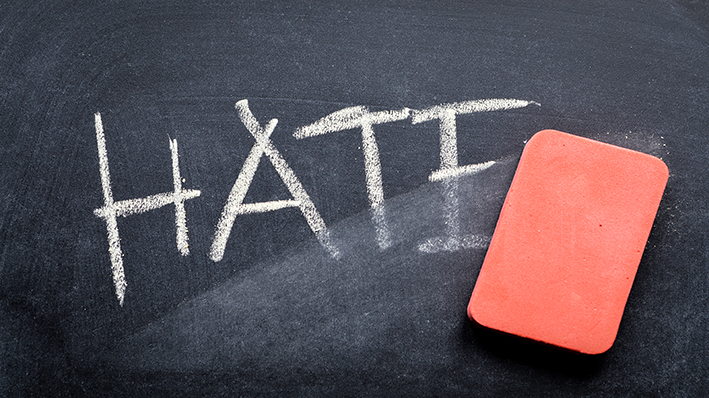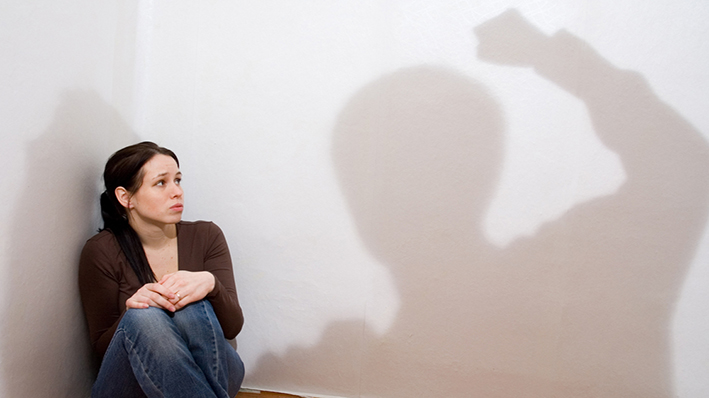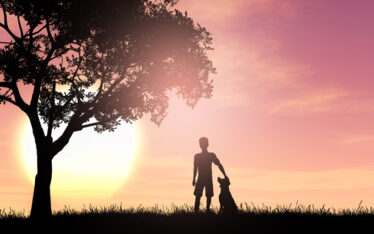
sebastianosecondi/Shutterstock.com
How do we hate? Why do we hate? Whom do we hate? When do we hate?
Racism. Sexism. Anti-Semitism. Homophobia. Islamophobia. Xenophobia. It seems as though throughout recent decades the branches of “hatred” have perpetually grown, stimulated by the light of news headlines as well as the dark side of Internet threads. Hatred towards specific identities of a group is nothing new to humanity. The dates in our history books written with the darkest of inks are those of wars, killings, genocides, etc. often cases of man hating man as he turns to some form of violence to express his supposedly justified disdain for the other.
HOW DEEPLY EMBEDDED
Although times have changed, our world looking far different than that of a previous century, the underlying philosophical thread that serves to assume we hate because we fear or because we believe to be victims of our own version of history remains timeless.
In the digital age, hate speech has become an increasingly more popular topic amongst us all as most of us take part in the world of social media. From there, we begin the debate of where do we draw the red flags that indicate this form of “free speech” to be a signal of a potential threat to the lives of a designated group of individuals? Words, such as “shootings” and “white supremacy”, seem to appear all too regularly on each our TV screens morning after morning. So, my three panelists and I must take on these conversations in an attempt to somehow understand the incomprehensible and alter the course of this historical malignancy.
- How do you define a hate crime?
“In my opinion, a hate crime is a crime which is intended towards a specific ethnicity, race, political party and/or religion (among other categories) with the aim to terrorize and further his or her political motive.” Gabriel Borsuk
“I define a hate crime as an act done to harm another person or group because of something they cannot control. Sexuality, race, religion, gender, disability, etc… These things are either impossible or extremely difficult to disown, which influences my decision to consider acts against them, a hate crime.” Lilliana Zar
“A hate crime as is an act of harm carried out against a member of an ethnicity or social group. I’d say it can range from simple hate speech to genocide. To be a bit clearer, a “crime” is an action that breaks the law, and there may be certain acts of hate that may not be considered against the law.” Amaury Lannes
- Do you think that hate crimes throughout the country have occurred more frequently in recent years?
“Looking at the United States through the scope of its entire history, in its inception, slavery was legal, and discrimination towards other minorities was very much legal and frequent. Talking in terms of the last few years, then my answer would be yes. Racist/ Anti-Semitic rhetoric rose as the Anti-Defamation league saw a 60% surge in incidents just last year. In fact, this was the largest single year increase on in anti-Semitic record and the second highest number reported since it has been tracking such data. In addition, a study by the Center for the Study of Hate and Extremism at California State University at San Bernardino found that hate crimes in the nation’s 10 largest cities increased by 12 percent last year, reaching the highest level in more than a decade.” Gabriel Borsuk
“I think that the election of Trump directly aided the statistical increase in hate crimes that has been widely documented. The crimes themselves seem more plentiful in the media, but also seem to fall out of relevance far more quickly than they had in the past. This is because there is a larger abundance of these stories to be told; and because we hear of them more frequently, it becomes normalized. In short, yes, hate crimes have occurred more frequently in recent years, even if their impact has become increasingly numbed.” Lilliana Zar
“Absolutely, there is no debate. Of course, the apologists are going to say that we are in a better situation than in the 60s: both the 1860s and 1960s. However, we are regressing. Nationally, levels in 2014 were the lowest since national reporting began in 1992, according to the FBI. Since then, hate crimes have steadily increased. In 2016, the last year with FBI totals available, hate crimes were up 11.7% compared to 2014.” Amaury Lannes
3. Have you ever felt personally affected by a hate crime?
“Whenever there is a hate crime, I feel affected in some manner. It’s terrible to see violence anywhere especially when the victims’ only crime was being who they are. Whether… the Charleston Church shooting or… Charlottesville, I was affected by what happened as were millions of Americans nationwide. Yet, there are some hate crimes that do hit close to home. For example, the synagogue shooting in Pittsburgh which resulted in 11 dead was reminiscent of a past that my community and family are too unfortunately familiar with… I believe it is of upmost importance to be vigilant and to remember the past. To come together and stay strong as a community is key to combatting any hate. This is what I believe we must do as Americans and most importantly as human beings.” Gabriel Borsuk
“I remember my dad telling me about a year ago about an Indian couple that was attacked in Kansas, resulting in the death of the husband. My dad also told me that the husband was shot because the white supremacist in the bar thought he was Iranian. I have not seen much coverage about it, or any allusion to the criminal’s intent beyond saying “Get out of my country” but I… felt personally affected, seeing my father (who is Iranian) so disappointed and sad. I live in a city with a large Iranian population and go to school with many Iranian Americans. I would say that I have not faced the brunt of community attacks as a result of hate crimes.” Lilliana Zar
“I am Mexican, and I have never been a victim of a hate crime. The reason why is because I specifically live in California. Hispanics make up the biggest ethnic group in California, there are more of us than white people in this state. Additionally, most of the white people here accept us and our culture. In fact, they absorb our culture, which is excellent. If I lived in Arizona or Texas, however, [Just witness El Paso.] it would be a completely different story.” Amaury Lannes
- What do you believe was the cause of that specific hate crime?
“I believe it boils down to fear. Fear leads to anger. Anger leads to hate. Hate leads to suffering. Anti-Semitism has been around almost since the inception of the Jewish religion itself. With the Holocaust, pogroms and massacres — for example the Inquisition— ranging throughout history, Jews have always been a persecuted people. This recent attack was just another example of it. What this reminds us as Americans is that we still have so much progress to make, not only on the expulsion of anti-Semitism but on the remnants of its racist and unjust past that we are still fighting to improve.” Gabriel Borsuk
“I believe that people who are misinformed by authors of history think this country belongs to white people. In the vast majority of American schools, the role of brown immigrants, slaves, and native Americans are downplayed or… swept under the rug. Along with the truth of resiliency in these communities– and with this resiliency, their contributions, their labor, and their legacy… There is an absence of respect for immigrants in America. From their accents to their culture, it is seen as “other”, whereas if history were taught right, immigration would be seen for what it is: the most quintessential and constant occurrence in America. This hate crime was because of the normalization of brown people as less deserving by our current administration, but also because of a gaping hole in our education system. Our inability to teach the respectable, even admirable, origins of cultures other than European. Our inability to, as a country, as a government, write down our wrongs and teach them such that they become right.” Lilliana Zar
- What hate crime do you think held a grand enough effect that could make it go down in a US History book twenty years from now?
“I think the events of Charlottesville will be remembered for years to come. Due to the gravity of what happened, the shock and the aftermath, this will for sure stay engraved as one of the darker moments of recent American history. With the images of neo Nazis screaming “Blood and Soil” and “Jews will not replace us”, it shocked a nation. The death of a peaceful protester was a moment all Americans will look back upon with shame and confusion as to how this was even possible.” Gabriel Borsuk
“The rally in Charlottesville, VA, will be remembered not because it surpassed other hate crimes in casualties or in scope, but because of Donald Trump’s reaction to it. On one side of the protest, there were Nazi and Confederate flag waving, KKK suit-donning, heil Hitler-ing “Americans”, and on the other there were people who opposed this. The sitting president of the United States managed to utter that “There were very fine people on both sides.” without being impeached for treason. Veterans died to defeat the Confederates and the Nazis, but he could not actively condemn the clearly white supremacist side because it represented (and represents) a large part of his base. Even if the average Trump voter is not a registered member of the KKK, their immigration, social, and economic policy aligns with “whites first”. If the white woman, who tragically died while countering this white supremacist rally, Heather Heyer, could not cause Trump to see the light, there is no way the Latinos of an El Paso Walmart can shake him awake, even if their tragedy was multiplied by 22. This mindset that the death of brown people is less sorrowful, this racism we are facing, and the normalization of this apathy by the current administration is abominable.” Lilliana Zar
“I think Dylann Roof’s mass murder could be written about in a history book because it ties 2 issues together, hate crimes and gun violence due to lack of gun control. Additionally, the act of hate occurred in a church in the South against African Americans, which is reminiscent of the Birmingham church bombing of 1963.” Amaury Lannes
- What do you think each of us can do in hopes of positively moving forward?
“What will help our society… is if each one of us stays vigilant and stays aware of what is happening in the world. To raise awareness, to have political dialogue with those you disagree, to bridge the political divide. Most importantly, to make yourself vulnerable and to fight for what you believe in and stand up against hate in whatever way possible… The one thing that destroys all types of hatred and terror is the sight of unity and love. That’s what I think will change our society for the better.” Gabriel Borsuk
“…VOTE, attend marches and rallies, run for office, educate your friends, call out your family members, volunteer for political organizations, call your senators, identify white supremacist rally attendees and get them fired or get justice for the crimes they committed. (Just like what’s currently being done to the men who beat DeAndre Harris at the Charlottesville rally.) And most importantly, educate yourself and practice empathy. Each immigrant story is nuanced, and there will be some things you may not understand. Just because it doesn’t happen to you, doesn’t mean it doesn’t happen. Anyone who wants to be American, can be American… Keeping an open and inclusive mind is the only way America will be great.” Lilliana Zar
“We need to constantly expose people who could potentially be racist to different cultures. Segregation only creates fear and hate. One of the reasons why white Californians generally accept Hispanic Californians is because we cohabitate in the same space. This is in stark contrast to the South, where whites and black people are still geographically separated, and where hate crimes are more prevalent than in California.” Amaury Lannes
It is hard to come up with solutions as to how to resolve the issue at its roots when it seems as though times now are too pressing. It seems as though all too many people are endlessly acting in the name of hate— be it through marching through the streets of Charlottesville, Nazi flag in hand, or driving eleven hours out to El Paso to target a predominantly Mexican community— the situation calls for urgent reaction. How do we react in the face of hate? From this sampling of the voices of today, here’s what we can induce: we must spread awareness; we must engage; we must stand up; we must blatantly call out hatred when we see it and advocate for a world in which we coexist in its absence. What can we do? There appears to be a shared thesis of the simplest answer: do something. Do not remain silent. With the newfound rise in youth’s activism, it seems as though this upcoming generation is one to new the value and weight in its voice and will use it to have shout for change, to have these conversations that educate and that we bring turn the page on hate within this country.

SamionauPavel/Shutterstock.com
About the Article
After years on the decline, hate crimes now seem to occur and reoccur at an inexplicable and frightening frequency.



